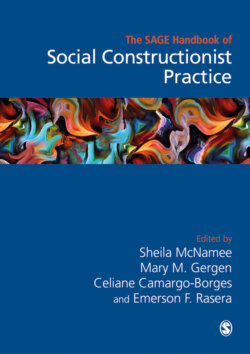Читать книгу The Sage Handbook of Social Constructionist Practice - Группа авторов - Страница 71
На сайте Литреса книга снята с продажи.
Overcoming Micro-Institutional Inertia
ОглавлениеThe journal of Action Research has been around for over 15 years. Our own process of transformation emphasized relational space. Before and during our associate editor meetings, we met in progressive trio groups so all participants could discuss the implications of a new emphasis. Coming back into plenary dialogue (we number a dozen people from eight countries; we meet by video which allows for breakout groups), there was more willingness than opposition to adopting a transformative agenda. There were also good questions, some too difficult to answer. For example, who would we attract and/or repel with this new emphasis? Would we be forced to reject papers that just a few weeks previously would have been considered good? To answer too soon would merely substitute speculation for inquiry. Perhaps such questions can only be answered through our practice. To take inquiry to practice required aligning in intention.
One board member called for more attention to our learning approach, asking us specifically to use our meetings for inquiring systematically into our own practice. We'd see in the intervening time which papers we saw as having potential and which not. We'd learn together to make these decisions more explicit together. We ended up agreeing that we'd look more carefully and reflexively at what constitutes truly ‘transformative’ action research. In other words, while we might not be able to tell in advance what the rejection process would be, we could simultaneously engage the new emphasis as a learning process for ourselves too. Moreover, we also agreed to bring more of the relational spirit to the review process itself. We agreed that the first round of review would remain completely blind, but that later rounds of review could begin to include meeting/dialoguing with reviewers and with authors, thus emphasizing community as part of inquiry in practice.
Different Associate Board members brought their own individuality, reflexivity and egocentricity to the effort. One board member chose to resign around this time.
As a follow up, I continued to lead ongoing trio meetings among board members, recording notes to ‘play forward’ to the next group. The heart of our work was to refresh the set of criteria by which we assess quality – called the 7 quality choice points – and which also help us discern how to develop papers toward publication.
We shared the new emphasis on transformation with our stakeholders, namely all readers, authors, reviewers. Six scholars volunteered to join as associate editors. We're really just getting started. Transformation is emergent. In turn there are practical issues, such as building our capacity for using social media, and joining, where welcome, the efforts of others and inviting them to ours. For this we use the Action Research Plus Foundation and the global community developing around it. It was founded with seed capital from the royalties associated with the Handbooks and Journal of Action Research. It is a foundation that also funds work that makes journal articles available in accessible blog posts and videos, as well as books (called Cookbooks) that share stories and resources for self and community transformation. At the ‘Transformations 2019’ conference in Santiago, Chile, two years after the Dundee conference with which this case opens, Action Research Plus (AR+) launched its new bilingual, Spanish/English Cookbook, helping to overcome a language barrier that prevents action researchers from the Global North and South learning together. This launch happened during huge street protests that called on the government to rewrite its constitution. It was also in the midst of a severe drought and a burden of pollution brought about by unregulated capitalism. A timely moment indeed.
